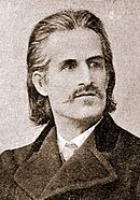Robert Hamerling
Robert Hamerling Poems
On a deep red rose
The angry lion trod
His paw caught fast the thorn
Of this delicate bud.
...
Say that I write bad verses,
Say that I steal the silverware,
Say I'm a rotten German
Because my diet says I can't eat Jews
...
Child, like a butterfly harmlessly
Fluttering past the pain-racked invalid,
When having seen me begin the homeward journey,
In the wake of suffering
Do not think of me in your flush of youth:
A fleeting thought is all that you would give;
...
Robert Hamerling Biography
Robert Hamerling (March 24, 1830 – July 13, 1889) was an Austrian poet. Biography Hamerling was born into a poor family at Kirchberg am Walde in Lower Austria. He displayed an early genius for poetry; his youthful attempts at drama excited the interest and admiration of some influential persons. Owing to their assistance young Hamerling was able to attend the gymnasium in Vienna and afterwards the University of Vienna.In 1848 he joined the students' legion, which played a large part in the revolutions of the capital, and in 1849 shared in the defence of Vienna against the imperialist troops of Alfred I, Prince of Windisch-Grätz. After the collapse of the revolutionary movement he was obliged to hide for a couple of weeks to escape arrest. For the next few years he pursued his studies in natural science and philosophy, and in 1855 became master at the Gymnasium at Trieste. For many years he was ill, and in 1866 retired on a pension, which in acknowledgment of his literary works was increased by the government to a sum sufficient to enable him to live carefree until he died at his villa in Stiftingstal near Graz, Austria. A popular edition of Hamerlings works in four volumes was published by M. M. Rabenlechner (Hamburg, 1900). Evaluations The 1911 Encyclopædia Britannica characterizes Hamerling as one of the most remarkable poets of the modern Austrian school, describing his imagination as rich and his poems as full of life and colour. What it terms his most popular poem, Ahasver in Rom (1866), of which the emperor Nero is the central figure, is said to show at its best what is alleged to be the author's brilliant talent for description. Among his other works, 1911 Britannica mentions Venus im Exil (1858); Der König von Sion (1869), characterized as a generally recognized masterpiece; Die sieben Todsünden (1872) Blätter im Winde (1887); Homunculus (1888); Amor und Psyche (1882). The 1911 Britannica goes on to describe his novel, Aspasia (1876), as giving a finely-drawn description of the Periclean age, but like his tragedy Danton und Robespierre (1870), somewhat stilted, which it thought showed that Hamerling's genius, though rich in imagination, was ill-suited for the realistic presentation of character. Robert Hamerling museum in its place of birth Kirchberg at the forest gives it a Robert Hamerling museum, which is carried by the Hamerling association. The German national politician George knight of more beautiful one let establish its birth house 1891 down-clever and in its place the donation house. Today also the municipal office of Kirchberg at the forest is in the donation house beside the museum.)
The Best Poem Of Robert Hamerling
The Lion And The Rose
On a deep red rose
The angry lion trod
His paw caught fast the thorn
Of this delicate bud.
His paw swelled large;
In angry pain he died.
Refreshed, the red rose drank
The early morning dew.
Be the delicate ever so delicate,
The rough ever so rough,
That which is fragile, gentle, pure —
Beauty, triumphs over all.
This mood — we can see it in everything he wrote — accompanied Hamerling through his life:
Be the delicate ever so delicate,
The rough ever so rough,
That which is fragile, gentle, pure —
Beauty, triumphs over all.
